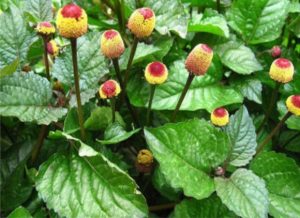BOTANICAL NAME: Anacyclus pyrethrum.
FAMILY: Compositae
ENGLISH NAME: Pellitory root
COMMON NAME:
Hindi: Akarakara
Bengali: Aakarkara

REFERENCE: BHAVAPRAKASH SAMHITA with link e Nighantu:
https://niimh.nic.in/ebooks/e-Nighantu/bhavaprakashanighantu/?mod=read
HABITAT: Indegenous of North Africa and introduced to South Europe.
BOTANICAL DESCRIPTION: It is hairy perennial procumbent plant that grows up to the height of 3 to 4 feet. Flowers are pale yellow or whitish in color. Its roots is called pellitory and is used medicinally.
AYURVEDIC PROPERTIES:
| RASA | GUNA | VEERYA | VIPAKA | PRABHAVA | DOSHGHNTA |
| Katu | Ruksha, tikshna | Ushna | Katu | – | Kaphavatshamak |
AYURVEDIC ENERGETICS:
| TASTE | PROPERTY | POTENCY | POST DIEGSTION EFFECT | ACTION | DOSHA ACTION |
| Katu | Dry, Piercing | Hot | Pungent | – | Kaphavata pacifying |
MAJOR CHEMICAL CONSTITUENTS: Essential oils, pelletrine and pyerethrin
THERAPEUTIC USES:
- Toothache: Root powder is to be used
- Erectile dysfunction: Flower powder is to be used with milk
- Sore throat: Flower powder mixed with water is to be used as gargle
- Urine retention: Root powder us to be used with honey
INDICATIONS:
Pakshaghat Paralysis, Apsamara Epilepsy, Kampvata Parkinson’s disease, Aamvata Rheumatoid arthritis
USEFUL PART: Root
DOSAGE: Root powder 0.5 -1 g
AYURVEDIC FORMULATION:
1. Akarakarabhadi churna
2. Akarakarabhadi vati
3. Akarakarabhadi avaleha
